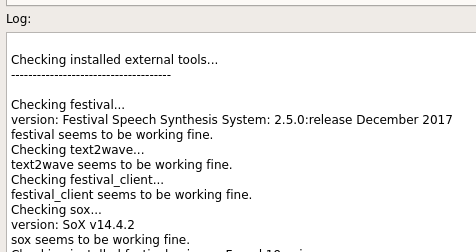Getting started¶
Installing dramaTTS¶
You will need a python3 distribution installed and for most convenience you should have either the pip or conda package manager installed.
On linux you will most likely have python and pip already installed - if not you should be able to install them with distributions package-manager.
E.g. for debian based system like ubuntu just run:
sudo apt-get python3-pip
or on arch based systems:
sudo pacman -S python-pip
For Windows users I would recommend to install Anaconda or miniconda, which will provide the conda package manager (make sure to get the python3 - not the python2 - version!).
To install dramaTTS with pip:
pip install dramatts
Note, that on some distributions you may install python2 and python3 in parallel. In such cases you should make sure, that you not using a pip for your python2 environment to install dramaTTS. Eventually you need to use pip3 as a command. You can check if you are using the correct pip by calling:
pip --version
To install dramaTTS with conda:
conda install -c thecker dramatts
In both cases pip or conda should download all required dependencies and should be able to launch the program. To do that just type:
python -m dramatts.dramatts_gui
The GUI should pop up and you can import text files, define roles etc., but you will not be able render audio unless you have installed Festival (and its components) and SoX.
Installing Festival without non-free components¶
While many linux distributions include pre-built packages for Festival they often include non-free components like festlex-OALD. Therefore the safest way to create a free Festival distribution is to compile from source. To form a free distribution following components could be used:
- Festival 2.5 (main application)
- Edinburgh Speech Tools (EST) - required to compile Festival
- festlex_CMU (lexicon)
- festlex_POSLEX (lexicon)
- festvox_cmu_us_slt_cg (female voice)
- festvox_cmu_us_rms_cg (male voice)
All components can be downloaded at CMU’s (Carnegie Mellon University) Festvox 2.5 release page. The source code of Festival and EST can also be cloned from the Festvox github page.
To compile the code follow the instructions in the INSTALL file included in Festival.
Note, that more voices can be found at the Festvox page (although some might require e.g. additional lexicons and thus won’t be working with the selected components above). Additionally voices may also be altered in tempo and pitch in dramaTTS (by post-processing with SoX) to create more than one speaker per voice.
Building Festival from source is based on the autotools-toolchain - so it shouldn’t be a problem on GNU/linux, but may be complicated on MS Windows.
Fortunately the eGuideDog team has created compile-instructions for Windows and even provides a Festival 2.5 version including precompiled binaries for Windows (which does not include the problematic festlex-OALD lexicon).
In order to use Festival under Windows with dramaTTS you will need to copy the text2wave.bat (see the /utils folder) to your Festival installation.
Make sure to adjust the paths in text2wave.bat, if you did not install Festival in C:\Festival.
Installing SoX¶
Under linux you will most likely have a pre-build package for SoX. Building from source is probably not required.
Binaries for Windows can be found on the SoX sourceforge page.
Configuring locations of external tools in dramaTTS¶
dramaTTS will try to determine the install locations of Festival and SoX automatically. This should most likely work under linux, if you installed the tools from the official packages (or put the location of the binaries in your PATH).
You can see, if the tools where found in the log windows of dramaTTS. A check will be performed each time dramaTTS is started - if all tools are configured correctly you will see messages like this in the log.

Under windows you will most likely have to define the tool locations manually.
To do that, just go to the Adjust program preferences in the dramaTTS GUI and specify the file locations.
If you used the Festival version provided by the link above the pre-compiled binaries are located in:
..Festival\src\main
After you specified a new tool location, you should save the preferences and restart dramaTTS to make the changes become effective.